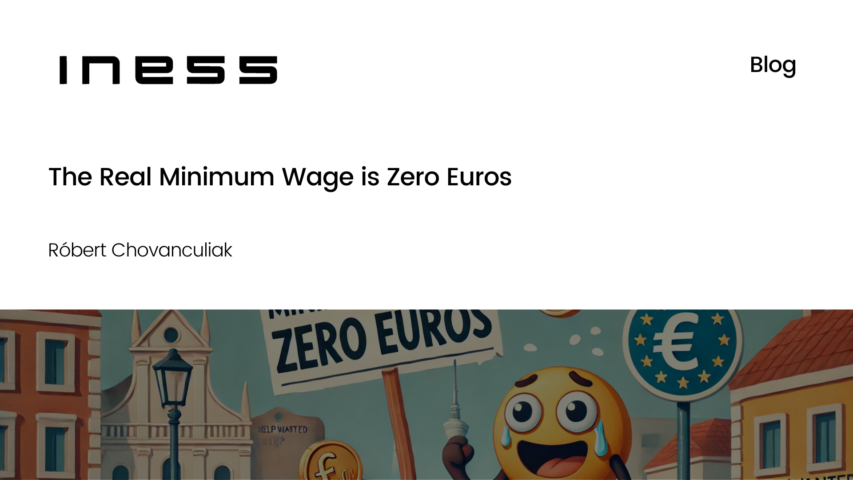The Actual Minimum Wage is Zero Euros

The Real Minimum Wage is Zero Euros
Róbert Chovanculiak // 13 November 2024
We all want people to have higher wages. Especially those with low incomes. But this is not done by setting an administrative salary from Bratislava for a waitress from Utekáč.
A proposal to raise the minimum wage in Slovakia to 60% of the average wage from two years ago is being put before Parliament. The argument is that the EU wants member states to have a minimum wage equivalent to 50% of the average wage in a given year. Currently, the Slovak minimum wage is set at 57% of the average wage from two years ago. If you find these EU calculations and recommendations confusing, you're not alone. To clarify, it may help to put this new government proposal in context. And for Slovakia, there’s no better comparison than the Czech Republic, which is also currently debating its minimum wage increase.
If the Slovak Parliament approves this proposal, the minimum wage would rise to around €920 by 2026. In the Czech Republic, however, they’ve chosen a different calculation method and percentages. Instead of using the average wage from two years prior, they estimate its level for the following year, setting the minimum wage at 43.4% of that figure. By this formula, the minimum wage in the Czech Republic is expected to reach 22,400 Kč by 2026 – equivalent to about €893.4, roughly €26 less than in Slovakia.
In 2026, the average wage in the Czech Republic is estimated to be €350 higher than in Slovakia. This shows that Slovak politicians are proposing a significantly larger increase in the minimum wage compared to their Czech counterparts. The minimum wage will represent 43.4% of the average wage in the Czech Republic, whereas in Slovakia, it will hit a record 53.8% – a striking difference of 10 percentage points. Additionally, Slovakia still maintains five minimum wage tiers, up to twice the base level, while the Czech Republic has abolished these tiers for the private sector. In Slovakia, any employee handling money at work automatically qualifies for the second tier, which is 20% higher than the standard minimum wage.
But that’s not all. Slovak politicians are also taxing the minimum wage more heavily – on both the employee and employer sides. While the Slovak minimum wage will be €26 higher, the wage bill for employers will increase by €57.6. On the employee side, the net wage will actually be higher in the Czech Republic by €23.5. Altogether, this means a total difference of over €80, largely due to Slovakia’s higher taxes and levies.
The comparison doesn’t stop there. Raising the minimum wage can be problematic because it often leads to job losses or prevents new jobs from being created. Logically, in a country with higher unemployment, you’d want to avoid policies that hinder job creation. Yet the opposite seems to be happening. The unemployment rate in the Czech Republic is 2.6%, while in Slovakia it is more than double, at 5.8%. Moreover, Slovakia has greater regional disparities in unemployment. The gap between the Czech region with the highest and lowest unemployment rates is twice as wide, while in Slovakia, it's three times wider. In fact, some Slovak regions still have unemployment rates above 10%.
Slovakia also faces more severe issues with long-term unemployment, youth unemployment, and unemployment among the uneducated – all of which are risk factors highlighted in economic literature when raising the minimum wage. However, this has not deterred Slovak politicians from gambling with the livelihoods of tens of thousands of people in poorer regions. Even a study by analysts from the Ministry of Finance has confirmed these negative effects.
In short, the minimum wage is the wrong tool for a well-intentioned goal. We all want higher wages, especially for those on low incomes. But raising wages across the board with a centrally-set minimum wage from Bratislava may help a few, but it could deprive others – like the waitress’s mother or her friends – of the opportunity to find work. This is why the minimum wage cannot truly improve society’s welfare; it can only redistribute poverty. The real minimum wage isn't what gets approved in Parliament or by the government. It's zero. That's what people earn when they can't find a job due to a high minimum wage.
This blog was originally published by INESS in Slovak.
EPICENTER publications and contributions from our member think tanks are designed to promote the discussion of economic issues and the role of markets in solving economic and social problems. As with all EPICENTER publications, the views expressed here are those of the author and not EPICENTER or its member think tanks (which have no corporate view).



